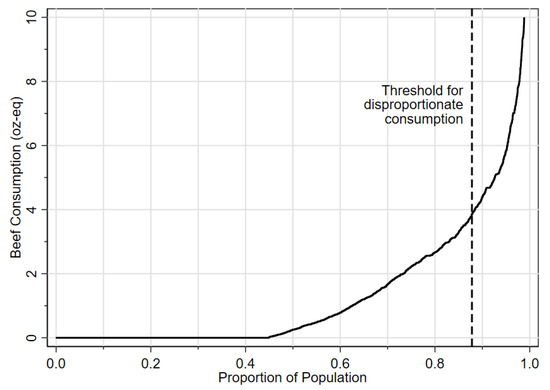166
Demographic and Socioeconomic Correlates of Disproportionate Beef Consumption among US Adults in an Age of Global Warming
www.mdpi.comConcern for the environment when making dietary choices has grown as the contribution of the food sector to global greenhouse gas emissions becomes more widely known. Understanding the correlates of beef eating could assist in the targeting of campaigns to reduce the consumption of high-impact foods. The objective of this study was to identify the demographic, socioeconomic, and behavioral correlates of disproportionate beef consumption in the United States. We analyzed 24-h dietary recall data from adults (n = 10,248) in the 2015–2018 National Health and Nutrition Examination Survey (NHANES). Disproportionate beef consumption was defined as an intake greater than four ounce-equivalents per 2200 kcal. Associations of this indicator variable with gender, age, race/ethnicity, education, family income, diet knowledge, and away-from-home meals were assessed using logistic regression, incorporating survey design and weighting. Disproportionate beef diets were consumed by 12% of individuals, but accounted for half of all beef consumed. Males were more likely than females (p < 0.001) to consume these diets. This relationship was seen in all bivariate and multivariable models. Older adults, college graduates, and those who looked up the MyPlate educational campaign online were less likely (p < 0.01) to consume a disproportionate beef diet. While almost one-third of reported consumption came from cuts of beef (e.g., steak or brisket), six of the top ten beef sources were mixed dishes: burgers, meat mixed dishes, burritos and tacos, frankfurters, soups, and pasta. Efforts to address climate change through diet modification could benefit from targeting campaigns to the highest consumers of beef, as their consumption accounts for half of all beef consumed.



This is the same study posted somewhere else. The survey is flawed in that they asked what people ate in the last 24 hours.
That simply means that those people ate a lot in the last 24 hours. Should have been over a week or a month to get a better distribution.
“We analyzed 24-h dietary recall data from adults (n = 10,248) in the 2015–2018 National Health and Nutrition Examination Survey (NHANES).”
Exactly. In a world where people at a big steak dinner once a week, you’d see a similar result.
Why would everyone be eating the big steak dinner the day before they were asked this survey question though?
I responded to your comment before, but didn’t sufficiently think it through, so I deleted my previous response.
You raise a good point, and they do indeed acknowledge this flaw in the study:
Yeah, I feel this is an early report to decide if a larger study is warranted
I don’t totally agree. I’d be interested in grouping the data by “response day of the week”, but given that the sample size is 10k (which is huge in nutrition science) and that they didn’t all respond at the same time, there’s definitely enough response time variability to reduce short term seasonality.
Honestly if you asked over the previous week or month you’d probably just get less accurate responses and it’d skew the data even more.
That’s such a leading method for gathering the data. You just ate the one cheeseburger you have every couple of months right before the study? Welp, I guess you’re the person responsible for all the beef purchases now!
deleted by creator
If that was all that was flawed… who actually takes time to do nutritional surveys? People who care about nutrition. And the current fad is that you should eat less meat. So a disproportionate number of them are going to under represent how much meat they eat. So it should say, only 12% of people who answered this survey were honest.
AKA healthy user bias